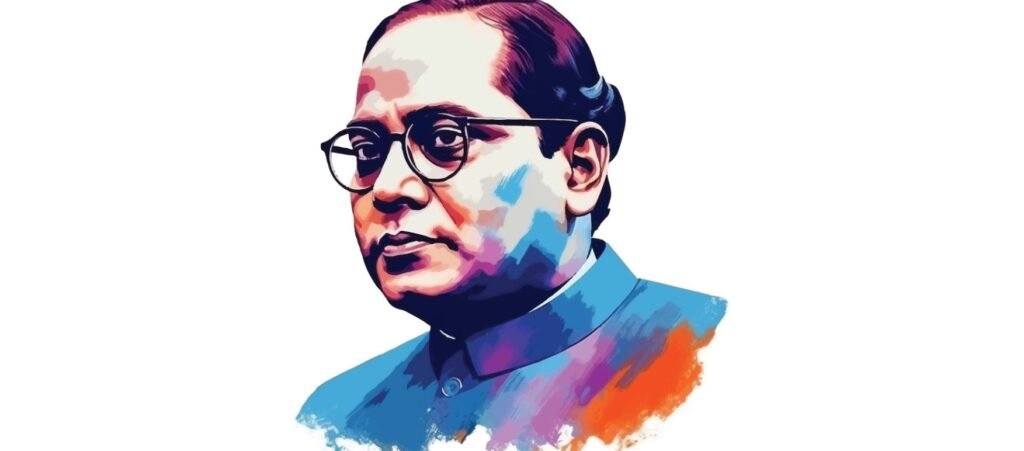
Who was Babasaheb Ambedkar?
Babasaheb Ambedkar, who was born on April 14, 1891, in Mhow, India, became a towering figure in Indian history due to his various contributions to society. Despite being a Dalit by birth and going through tremendous discrimination during his lifetime Ambedkar overcame all odds and went ahead to become a symbol of social change.
In his quest for knowledge, Ambedkar sought higher education overseas and earned degrees from prestigious universities including Columbia University in the USA, the London School of Economics in England and the University of Bonn in Germany. His knowledge of economics formed the basis of his insightful analysis of social disparities and economic imbalances.
Ambedkar spent his life as a social reformist fighting against caste system-based discrimination and advocating for the rights of marginalised communities. His visionary leadership during the drafting of the Indian Constitution ensured the inclusion of equality, freedom and fairness for everyone. In addition to politics, he also made significant contributions towards parliamentary reforms aimed at uplifting those languishing under oppressive regimes.
Accordingly, Babasaheb’s lifestyle epitomizes an unrelenting desire for fairness, parity as well as empowerment thereby marking an indelible mark on societal fabric.
Ambedkar’s Life and Mission
Babasaheb Ambedkar’s existence is said to be characterised by his dogged struggle against caste discrimination which he started from his early days in a society that was deep rooted in oppressive caste hierarchies. He did not give up even though he had access to education only, he made the most of it and this gave him self-satisfaction to shape his thinking and mission.
His educational accomplishments overseas, especially in countries like Germany, the United States, and England, exposed him to liberal ideas and egalitarianism that defied the Indian rigid caste system. These explorations sparked his desire for social reforms as well as made him investigate another equitable and all-inclusive nation-state.
One of the leading lawyers, academicians and political leaders in India Ambedkar fought tirelessly for marginalised communities’ rights. His central role during the framing of the Indian constitution saw to it that there were provisions for equality & social justice thus reflecting his uncompromising stand on creating an equal India.
Throughout his career, Ambedkar led countless movements and initiatives aimed at empowering the oppressed while eliminating caste-based discrimination. His vision of an egalitarian society envisaged a country where each person would realise their full potential without regard to caste or creed, could recognize their complete capability and revel in the same rights and possibilities. Ambedkar’s existence and assignment continue to encourage generations to attempt for social justice and equality.
Ambedkar’s Contributions to the Society
The Father of the Indian Constitution
Babasaheb Ambedkar’s management in drafting the Indian Constitution solidifies his status as the Father of the Indian Constitution. As Chairman of the Drafting Committee, he prompts the Constituent Assembly through complicated negotiations and debates, ensuring the document’s adherence to democratic standards.
Embedded inside the Constitution are Ambedkar’s fundamental concepts of equality, freedom, and fraternity. These beliefs, drawn from his deep dedication to social justice, underpin the democratic cloth of India. Ambedkar envisioned a society in which every character, no matter caste, creed, or gender, could revel in identical rights and opportunities.
Ambedkar’s imagination and prescient for social justice located expression in the Constitution through provisions along with reservations for Scheduled Castes (SC) and Scheduled Tribes (ST). By introducing affirmative action measures, Ambedkar sought to rectify historical injustices and deal with the systemic discrimination faced with the aid of marginalized groups.
His pioneering efforts in crafting a revolutionary and inclusive Constitution laid the muse for a democratic India constructed upon the concepts of equality, justice, and dignity for all its residents. Ambedkar’s enduring legacy continues to encourage generations in the ongoing pursuit of an equitable society.
Worked for spreading Education
Babasaheb Ambedkar’s hard work to popularise schooling amongst Dalits and other marginalised groups has become a cornerstone of his social reform timetable. He passionately endorsed equal entry to instructional opportunities as he considered mastering to be an awesome device for empowerment and freedom from caste-based oppression.
Ambedkar is concerned about education beyond words as he established the institutions with the practical goal and facilities to access high-quality education. More specifically, he founded the PES (People Education Society) in 1945, which is important in setting up educational facilities for the less wealthy members of society. His dedication to improving education is demonstrated by his founding of Siddharth College in Mumbai under PES.
What is more, Ambedkar had great faith in higher education whereby he encouraged Dalit children not to be influenced by the systemic challenges they encountered but rather strive for academic excellence. Consequently, this marked the onset of many tutorial institutions targeting marginalised groups, creating a generation of educated people who could challenge societal norms and vouch for their rights.
Now, through unending efforts to spread education, Ambedkar not only effectively transformed men’s and women’s lives but also brought a way for social progress and upliftment, leaving an indelible mark on India’s education.
Ambedkar and Women Empowerment
Ambedkar became a visionary social reformer who diagnosed the cost of ladies’s contributions to societal progress and played a large position in organising ladies’ rights in India. He laboured hard to increase ladies’ rights by way of imposing many social, political, and economic strategies. He became a fervent supporter of gender equality because he thought patriarchal structures that discriminated in opposition to women should be destroyed. He endorsed girls’ training due to the fact he concept it would be important to their empowerment and freedom from repressive conventions. Ambedkar had a pivotal role in enacting rules and advancing the status of women through his legislative endeavours, consisting of his contribution to the writing of the Hindu Code Bill.
Ambedkar Books
Annihilation of Caste:
Annihilation of Caste is a seminal work by Dr B.R. Ambedkar, originally written as a speech for the annual conference of the Jat-Pat Todak Mandal, an organization dedicated to social reform in Lahore. Due to severe ideological disagreements, it was never presented at the conference. Instead, it was published as a book in 1936, providing a harsh critique of the caste system in India and calling for its annihilation. In this work, Ambedkar methodically deconstructs the caste system’s hierarchical organisational pattern and reveals the power dynamics between different caste groups. He also identifies the belief structures and practices that lead to oppression and discrimination and argues that the caste system must be annihilated for justice to be achieved.
Thus, Ambedkar’s critique goes beyond mere criticism, it provides a deep analysis of the historical roots and socio-economic implications. He calls for a radical rethinking of the Indian society along the tenants of liberty, equality and fraternity, a call to human beings to move past their caste-dom and assume a broader nature of understanding and accepting others. Some 80 years after its first publication, Annihilation of Caste, remains the seminal document of anti-caste discourse and inspiration for reformers. It continues to be relevant for Ambedkar’s teachings on rights and social justice.
The Untouchables:
The Untouchables is a seminal painting authored with the resource of Dr B.R. Ambedkar, presenting a profound exploration of the social and ancient plight of Dalits, additionally known as the Untouchables in India. Ambedkar, himself born right into a Dalit family, offers a comprehensive evaluation of the oppressive caste system that relegated Dalits to the bottom rungs of society, subjecting them to systemic discrimination, exploitation, and indignity.
In this e-book, Ambedkar delves into the roots of untouchability, tracing its origins to historic Hindu scriptures and the inflexible hierarchical shape of caste. He elucidates the multifaceted dimensions of untouchability, inspecting its impact on several additives of Dalit lifestyles, along with social, monetary, and political spheres.
Through meticulous research and insightful comments, Ambedkar exposes the entrenched inequalities perpetuated by way of the caste machine and advocates for radical social reform to dismantle the oppressive systems that marginalise Dalits. He requires a whole overhaul of societal norms and establishments, emphasising the vital of equality, dignity, and justice for anyone irrespective of caste or social repute.
The Untouchables stands as a seminal painting that does not shed mild on the historical injustices confronted using Dalits however moreover serves as a clarion name for social transformation and the belief of Ambedkar’s imaginative and prescient of an equitable and inclusive society.
The Buddha and his Dhamma:
The Buddha and His Dhamma is a seminal narrate of the use of Babasaheb Ambedkar that offers a complete assessment of the lifestyles, teachings, and philosophy of Gautama Buddha, further to an exploration of the important standards of Buddhism, referred to as the Dhamma. Through this e-book, Ambedkar elucidates the profound insights and moral ideas espoused by way of manner of the use of the Buddha, aiming to revitalise Buddhism and sell its relevance in gift-day society.
The e-book delves into various factors of the Buddha’s lifestyle, together collectively with his delivery, enlightenment, and teachings, presenting readers with profound facts about his transformative adventure and the undying expertise he imparted. Ambedkar meticulously analyses the middle teachings of Buddhism, which include the Four Noble Truths and the Eightfold Path, elucidating their importance in alleviating human conflict and fostering spiritual liberation.
Also, the Buddha and His Dhamma explore the socio-political dimensions of Buddhism, highlighting its ability as a strain for social justice, equality, and emancipation. Ambedkar emphasises the significance of utilizing Buddhist principles to deal with contemporary-day traumatic conditions and assemble a further easy and compassionate society.
Overall, the e-book serves as a complete guide to Buddhism, imparting readers profound insights into the life and teachings of the Buddha at the same time as advocating for its relevance in shaping an extra-enlightened and ethical global. For more insights on similar topics, explore Chrysalis High. Delve into a wealth of resources tailored to enlighten and engage.
FAQs
Ambedkar’s contribution to human rights consists of advocating for the rights of marginalized groups, drafting India’s Constitution with provisions for equality, and leading social movements against caste discrimination.
Dr Ambedkar was posthumously presented with the Bharat Ratna, India’s maximum civilian award, in 1990.
The old call of Ambedkar was Bhimrao Ramji Sakpal.
Ambedkar modified his call to honor the memories of his ancestors and to reject the caste identity associated with his former surname.


